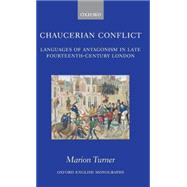
Note: Supplemental materials are not guaranteed with Rental or Used book purchases.
Purchase Benefits
What is included with this book?
| Introduction: Chaucerian Conflict | |
| Discursive Turbulence: Slander, the House of Fame , and the Mercers' Petition | |
| Urban Treason: Troilus and Criseyde and the Treasonous Aldermen of 1382 | |
| Idealism and Antagonism: Troynovant in the Late Fourteenth Century | |
| Ricardian Communities: Thomas Usk's Social Fantasies | |
| Conflicted Compaignyes: The Canterbury Fellowship and Urban Associational Form | |
| Conflict Resolved?: The Language of Peace and Chaucer's 'Tale of Melibee' | |
| Conclusion | |
| Table of Contents provided by Publisher. All Rights Reserved. |
The New copy of this book will include any supplemental materials advertised. Please check the title of the book to determine if it should include any access cards, study guides, lab manuals, CDs, etc.
The Used, Rental and eBook copies of this book are not guaranteed to include any supplemental materials. Typically, only the book itself is included. This is true even if the title states it includes any access cards, study guides, lab manuals, CDs, etc.